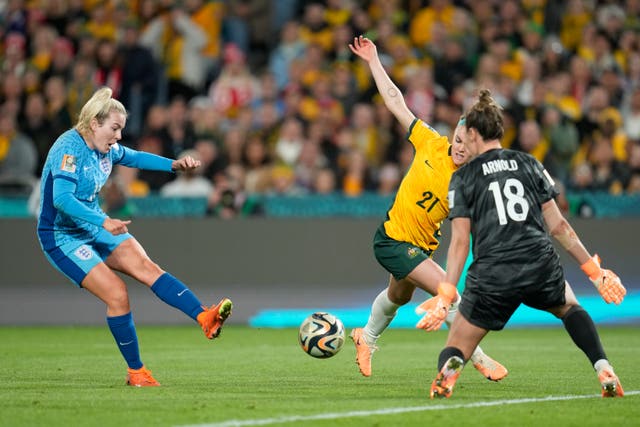
FIFA president Gianni Infantino feels equal pay at the Men’s and Women’s World Cups would only be a “symbol” that would not “solve anything” if additional development targets for the women’s game are not achieved.
On Sunday, England will play Spain in the final for their share of an increased prize pot of 110 million US dollars (£86.1m) for this tournament, more than three times than what was on offer for the 2019 Women’s World Cup in France, but still significantly less than the 440 million USD (£346m) awarded at the 2022 men’s competition in Qatar.
Infantino has previously outlined ambitions for prize parity by the 2026 and 2027 World Cups but two days before the conclusion of the ninth edition of the women’s showpiece, challenged stakeholders to do more.
Infantino said: “Let’s really go for a full equality. Not just equal pay in the World Cup, which is a slogan that comes up every now and then. Equal pay in the World Cup, we are going in that direction already.
“But that would not solve anything. It might be a symbol but it would not solve anything, because it’s one month every four years and it’s a few players out of the thousands and thousands of players. We need to keep the momentum. We need to push it. We need to go for equality but we have to do it for real.”
The president also drew criticism for his closing remarks, which some felt placed an undue burden on women to make change, and paradoxically urged them to push doors he claimed were already open.
He said: “And I say to all the women, and you know I have four daughters, so I have a few at home, I say to all the women that you have the power to change.
“Pick the right battles. Pick the right fights. You have the power to change. You have the power to convince us men what we have to do and what we don’t have to do. You do it. Just do it. With men, with FIFA, you will find open doors. Just push the doors. They are open.”
Two months before the tournament, Infantino threatened that he may be “forced not to broadcast” the World Cup in Europe’s ‘big five’ countries following what he felt were “very disappointing and simply not acceptable” offers from broadcasters, though deals were eventually done.
Viewing figures have broken records in Australia, where a peak 11.5 million people – about 46 per cent of the population – tuned in to watch the Matildas play England in their semi-final, the country’s most-watched television programme of any kind since 2001 when the existing rating system was established.
Back at home, the 7.3 million people who viewed the same contest on BBC One comprised the biggest UK audience of the World Cup so far, and on Friday Infantino reiterated his view that broadcasters have a part to play in the prize parity target.
The 2023 tournament was expanded to 32 teams, and is also the first time the competition has been hosted by more than one country, but Infantino said it has been a financial success.
Infantino said: “Some voices were raised, where it cost too much, we don’t make enough revenues, we will have to subsidise.
 England’s semi-final against Australia was viewed by almost half of the Australian population (Abbie Parr/AP)
England’s semi-final against Australia was viewed by almost half of the Australian population (Abbie Parr/AP)
“And our opinion was, well if we have to subsidise, we will subsidise, because we have to do that.
“But actually, this World Cup generated over 570 million US dollars in revenues, and so we broke even. We didn’t lose any money and we generated the second-highest income of any sport, besides of course the men’s World Cup, at a global stage. More than half a billion (in revenues).”


Why are you making commenting on The Herald only available to subscribers?
It should have been a safe space for informed debate, somewhere for readers to discuss issues around the biggest stories of the day, but all too often the below the line comments on most websites have become bogged down by off-topic discussions and abuse.
heraldscotland.com is tackling this problem by allowing only subscribers to comment.
We are doing this to improve the experience for our loyal readers and we believe it will reduce the ability of trolls and troublemakers, who occasionally find their way onto our site, to abuse our journalists and readers. We also hope it will help the comments section fulfil its promise as a part of Scotland's conversation with itself.
We are lucky at The Herald. We are read by an informed, educated readership who can add their knowledge and insights to our stories.
That is invaluable.
We are making the subscriber-only change to support our valued readers, who tell us they don't want the site cluttered up with irrelevant comments, untruths and abuse.
In the past, the journalist’s job was to collect and distribute information to the audience. Technology means that readers can shape a discussion. We look forward to hearing from you on heraldscotland.com
Comments & Moderation
Readers’ comments: You are personally liable for the content of any comments you upload to this website, so please act responsibly. We do not pre-moderate or monitor readers’ comments appearing on our websites, but we do post-moderate in response to complaints we receive or otherwise when a potential problem comes to our attention. You can make a complaint by using the ‘report this post’ link . We may then apply our discretion under the user terms to amend or delete comments.
Post moderation is undertaken full-time 9am-6pm on weekdays, and on a part-time basis outwith those hours.
Read the rules here